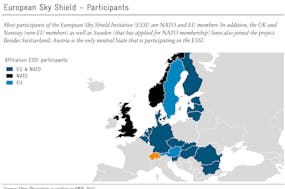What was hardly imaginable not long ago has become reality today: the Corona pandemic has kept society in its grip and decision-makers on the go for over a year. From a democratic point of view, March 16, 2020 stands out. On that day, the Federal Council declared the “extraordinary situation” allowing for the immediate adoption of emergency measures by decree. The first anniversary is reason enough to take a look back critically at the effects of the Corona crisis on Swiss democracy and draw lessons for potential future emergencies.
A new political mindset needed
The restriction of political rights provides a striking example for such a lesson. The argument for postponing the May 2020 federal referendum and freezing deadlines for the submissions of popular initiatives and referendums was already at odds with reality last year. The Federal Council never managed to explain why digital channels were well suited enough for extensive public debate on the adequacy of the Corona measures, but inadequate for a comprehensive opinion-forming process before the referendum.
In fact, the canton of Schwyz and the city of Lucerne demonstrated the contrary by successfully holding local elections during the first lockdown. This cannot come as a surprise to many in a country where casting one’s vote at the polling station on voting day has been in steady decline for ages. Even before the Corona crisis, early voting accounted for more than 90 percent of votes cast in both urban and rural cantons.
However, these arguments may not be sufficient to safeguard direct democracy in times of crisis. Depending on the type of crisis or the type of virus, the measures may no longer be premature. Only the consistent digitization of democracy will facilitate progress. But the nationwide introduction of e-collecting and e-voting first requires a change of heart among politicians – the majority of whom remain skeptical towards advancing Swiss democracy and relevant parliamentary procedures into the digital era. In this context, the pandemic offers an opportunity for a fresh start.
Discussing IT fundamentals at an early stage
It is not just a matter of prioritizing the digitization of democratic procedures. Just as crucial is not to neglect the technical aspects of digitization. Fundamental questions about the IT design of such projects (e.g., related to data protection) should not be addressed in ordinances after a popular referendum. Instead, they should be publicly discussed at an early stage in the political decision process. By implementing this approach – known as “privacy by design” – the government can fulfill its responsibility for transparency towards the population – a prerequisite to gaining popular support in referendums.
Interestingly, the March 7 rejection of the referendum on an electronic identity could mark the onset of change. Proponents and opponents have now submitted a joint resolution to relaunch the electronic identity project, with a strong emphasis on the principles of “privacy by design,” data economy and decentralized data storage.
Less crisis management, more democratic decisions
It is the longevity of the current Corona measures that should raise the greatest objections. According to the Federal Covid-19 Act, the Federal Council must inform parliament of its decisions and consult the cantons on matters usually in their domain. However, the fact is that even almost a year after the outbreak of the pandemic, the federal government can still practice centralized crisis management, which in its current form significantly deviates from Switzerland’s usual decision-making structures.
While a crisis – extraordinary as it may be – progresses, Switzerland should return to a model of regular interactions between Federal Council and Parliament. Given that the institutional interplay is characterized by a very balanced division of power between executive and legislature compared to other industrialized countries, this delicate equilibrium should not be suspended for too long.
One way to counterbalance the extended powers of the Federal Council would be to temporarily appoint a “crisis commission” of representatives of both parliamentary chambers. Establishing a body that is in a “permanent special session” could be considerably facilitated if parliament’s infrastructure were fit to switch to virtual operation in crises. A digital Parliament would also make it easier for the legislature to control the Federal Council’s crisis management efforts so the events of mid-March 2020, when the legislature suspended itself, would not be repeated.
Parliament’s recent spring session, during which several motions in favor of digital and representative advances were put forward, indicated that quite a few politicians sensed the inevitability of change. Cautious optimism for a crisis-proof democracy no longer seems so inappropriate.
More information can be found in our publication “Democracy and Federalism Derailed by the Coronavirus?” (German or French version available).





